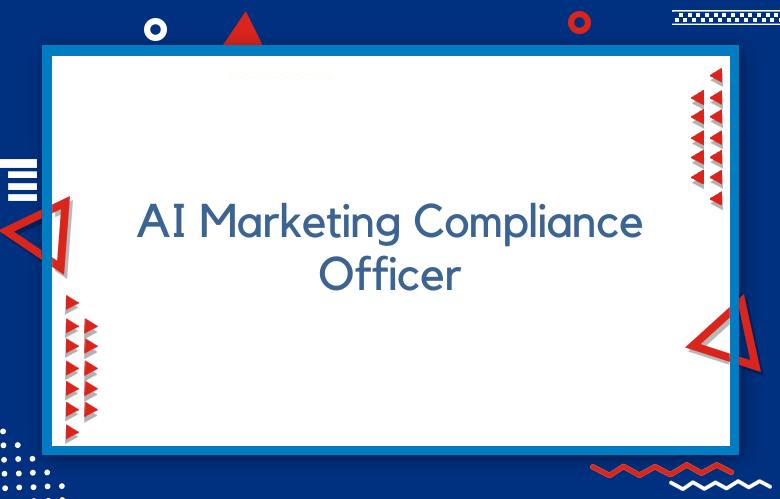The Rise and Fall of AI Marketing Compliance Officer

With the increasing use of artificial intelligence in various business facets, the idea of an AI Marketing Compliance Officer (AMCO) emerged—the concept of AMCO aimed to achieve Compliance in marketing tactics within businesses.
The AMCOs were to monitor the various marketing channels and ensure that companies followed all the regulations. However, the rise and fall of AI Marketing Compliance Officers tell a different story.
AI-powered marketing automation services were introduced to help with compliance monitoring and documentation tracking. This innovation brought about the concept of an AI Marketing Compliance Officer.
Businesses started implementing AMCOs to alleviate the strain of continuously monitoring their marketing campaigns‘ compliance level. These AI marketing officers were designed to review and report on all the advertisements, social media posts, and other marketing channels accurately and precisely.
How AI Tools Can Aid Compliance Officers Today
Regulatory Compliance has become increasingly complex and crucial in today’s business landscape. Regulatory bodies impose strict guidelines, rules, and regulations across various industries, making it challenging for companies to stay compliant.
Compliance officers’ most significant challenge is keeping up with changing regulations and ensuring their organizations adhere to them.
However, in recent years, Artificial Intelligence (AI) tools have emerged as a powerful ally for compliance officers. AI-powered agencies can quickly process vast amounts of data, identify non-compliant behaviors, and alert compliance teams in real-time. These tools provide various benefits that aid compliance officers in their day-to-day operations.
The Role of AI in Compliance Careers
The compliance field is rapidly evolving, thanks to the advancements in Artificial Intelligence (AI) technologies. With the increasing need for regulatory adherence across different industries, the role of AI in compliance careers has become more critical than ever before.
AI offers powerful tools to help compliance professionals monitor, detect, and report violations in real time, enabling companies to stay on top of regulatory compliance frameworks.
One of the most notable benefits of AI in Compliance is its ability to track data in real-time to identify discrepancies and violations. This feature mainly benefits the financial industry, where the massive amounts of data can be challenging for humans to monitor continuously.
With AI tools, compliance professionals can flag any suspicious transactions or patterns identified in the data, minimizing the risk of financial crime and fraud.
Compliance Officer: Duties and Requirements
Understand the Law
A Compliance Officer must thoroughly understand their industry’s laws and regulations. This includes federal and state laws and any applicable international laws. They must also be familiar with relevant industry codes of conduct or best practices.
Monitor Compliance
A Compliance Officer monitors the organization’s Compliance with all applicable laws and regulations. This includes conducting regular audits to ensure the organization complies, identifying non-compliance areas, and developing corrective action plans to address them.
Develop Policies and Procedures
A Compliance Officer must develop policies and procedures to ensure the organization complies with all applicable laws and regulations. This includes creating internal controls to prevent non-compliance, developing training materials for employees, and crafting an effective system to monitor Compliance on an ongoing basis.
Investigate Non-Compliance Issues
If a Compliance Officer discovers a violation of the law or other regulations, they are responsible for investigating it thoroughly to determine its cause and extent. If necessary, they must take appropriate action to address it, such as imposing disciplinary measures or filing a report with the relevant authorities.
Keep Records
A Compliance Officer must maintain accurate records of all activities to ensure organizational Compliance, including audit results, corrective action plans, training materials, etc. These records can be used in court proceedings to prove that the organization was always in Compliance.
Provide Advice
A Compliance Officer must provide advice and guidance on how best to comply with applicable laws and regulations when asked by other members of the organization’s staff or management team.
They may also be called upon to provide expert testimony in court proceedings regarding their knowledge of regulatory matters related to their industry or sector of business activity.
Educate Employees
A Compliance Officer needs to educate employees about relevant laws and regulations. Hence, they understand what is expected of them regarding Compliance with the organization’s operations or activities.
This can include providing training sessions or seminars on relevant topics and distributing written materials such as newsletters or handbooks, etc., as needed throughout the year, depending on changes in applicable laws or regulations.
Stay Up to Date on Changes
A Compliance Officer must stay up-to-date on changes in applicable laws and regulations to ensure that the organization remains compliant at all times. They must implement any necessary changes quickly when required.
Compliance Manager: Leading Regulatory Compliance Efforts
As a Compliance Manager, you will lead regulatory compliance efforts across various industries and ensure that organizations adhere to legal and ethical standards.
Your primary objective will be to design, implement, and monitor compliance programs that mitigate the risk of regulatory non-compliance and protect the company’s reputation.
Your role will demand expertise in legal and regulatory requirements and an in-depth understanding of industry-specific risks and challenges.
You will be responsible for maintaining awareness of regulatory changes and ensuring organizations comply with the latest laws and regulations.
Regulatory Affairs Director: Navigating Complex Regulatory Landscapes
Regulatory affairs have always been a crucial area for businesses. With the increasing globalization of industries, it has become even more critical for organizations to navigate complex regulatory landscapes efficiently.
As a Regulatory Affairs Director, the role entails maintaining a thorough and up-to-date knowledge of the ever-evolving regulatory environments across different regions and industries.
This involves monitoring the latest changes in regulations, keeping abreast of the latest technological advancements, and keeping track of the latest best practices in regulatory Compliance.
An essential aspect of the job is ensuring that the organization fully complies with relevant regulations and standards.
This requires extensive knowledge of various legal and regulatory frameworks, including safety, environmental, and quality standards, and an understanding of emerging trends and potential risks.
The Regulatory Affairs Director should also be able to identify potential problems and provide practical solutions to ensure that the company’s products are safe, effective, and of high quality.
Compliance Analyst: Analyzing Data and Identifying Compliance Issues
As a Compliance Analyst, you will analyze large volumes of data, identify potential compliance issues, and recommend corrective actions. You will work closely with other members of the compliance team and various stakeholders across the organization.
Your role will involve conducting thorough reviews of internal policies and procedures to ensure they comply with relevant laws and regulations. You will be expected to keep abreast of changes in these laws and regulations and update policies accordingly.
In addition to reviewing policies, you will conduct audits and investigations to identify potential non-compliance issues. This will involve analyzing data from various sources, such as financial records, employee emails, and customer complaints.
Leveraging AI for Marketing Compliance: Benefits and Challenges
Automated Monitoring of Regulations
One of the primary benefits of leveraging AI for marketing compliance is the automated monitoring of regulations. Artificial intelligence can be used to monitor and track changes in regulations, ensuring that all marketing efforts comply with applicable laws.
This can help businesses avoid costly fines and reputational damage due to non-compliance. AI systems can proactively identify potential non-compliance issues before they become problematic.
Improved Compliance Efficiency
Leveraging AI for marketing compliance can also help improve efficiency by automating manual processes such as data entry and analysis.
By automating these tasks, marketers can spend more time focusing on other aspects of their campaigns, such as developing creative content or optimizing targeting strategies. This increased efficiency can improve marketing results and cost savings over time.
Increased Transparency
AI systems can also increase transparency in marketing activities by tracking user behavior and providing insights into customer preferences and buying patterns.
This information can be used to develop more effective campaigns tailored to specific audiences, leading to better overall results. It can also detect potential regulations violations quickly, allowing businesses to take corrective action if necessary.
Enhanced Customer Experience
AI systems can also help enhance the customer experience by providing personalized recommendations based on past purchases or browsing history.
For example, customers may receive an email recommending products they are likely interested in based on their previous activity on the site or app. By providing customers with relevant recommendations, businesses can build trust and loyalty among their customers, which leads to higher sales over time.
Data Security Risks
One of the main challenges associated with leveraging AI for marketing compliance is the risk of data security breaches, which can occur when malicious actors or hackers attempt to access sensitive customer information stored in the system’s databases or cloud services provider’s servers.
To mitigate this risk, businesses should ensure that all data is encrypted at rest and transmitted securely using secure protocols such as TLS/SSL when possible.
Companies should regularly monitor their systems for any suspicious activity that may indicate a breach has occurred so that it can be addressed promptly if needed.
Lack of Expertise
Another challenge with leveraging AI for marketing compliance is the lack of expertise to implement and maintain AI solutions within organizations successfully.
While many tools make it easier for marketers with more technical backgrounds to use AI solutions, having technical expertise on staff is still essential to ensure successful implementation and ongoing maintenance.
Costly Implementation
A third challenge associated with leveraging AI for marketing compliance is the cost associated with implementing these solutions.
Many companies find that investing in an AI solution upfront is too costly, especially considering the ongoing maintenance, training, and upgrades costs.
As such, many companies opt for cheaper alternatives such as manual processes or off-the-shelf software solutions, which may need to provide a more comprehensive solution but still offer some level of protection from regulatory penalties.
Ethical Considerations
Leveraging AI for marketing Compliance involves ethical considerations, which must be considered before implementing any solution. For example, using facial recognition technology could lead to discriminatory practices if implemented incorrectly.
Companies must ensure they have appropriate measures for collecting personal data from customers, storing it, and using it once it is gathered.
The Growing Impact of AI Tools on Compliance Officers
Artificial intelligence (AI) tools are being used in various industries. This trend has not missed the compliance sector, where AI tools have become game-changers for compliance officers.
Regulatory Compliance has become a critical aspect of business operations in many industries. Compliance officers ensure organizations adhere to government regulations, industry standards, and internal policies.
Compliance officers’ workloads have grown significantly with the increase in regulatory requirements. However, many of the tasks that these professionals perform are repetitive and time-consuming, making them prone to errors.
Enhancing Compliance with AI: Best Practices and Considerations
Understand Your Regulatory Environment
Understanding your industry’s regulatory environment and the laws that govern it is essential. This will help you identify potential risks and ensure Compliance with all applicable regulations.
Understanding the regulatory environment will help you develop an AI strategy that aligns with your company’s legal obligations.
Develop a Governance Structure
Developing a governance structure for your AI system is essential to ensure Compliance with all applicable regulations.
This should include policies and procedures to ensure Compliance with all applicable laws and regulations. The structure should also clearly define the roles and responsibilities of all stakeholders involved in the AI system’s development, deployment, and maintenance.
Implement Appropriate Data Management Processes
Data management processes are essential for ensuring Compliance with data protection laws such as GDPR or CCPA.
These processes should include data encryption, access controls, data retention policies, and regular audits of data processing activities. They should also be regularly reviewed to remain current with changing regulations.
Monitor System Performance
Monitoring system performance is essential for ensuring Compliance with AI systems as it allows you to detect potential issues or discrepancies before they become more serious problems.
This can be done by running regular tests on the system and monitoring its performance over time to identify any changes or irregularities in its behavior or output.
Establish Transparency Measures
Transparency measures are essential for ensuring that users understand how an AI system uses their data and how the system makes their decisions.
This can be achieved by explaining how the system made decisions or providing an audit trail of user interactions with the system over time so users can review their activity history if needed.
Utilize Fairness Tools
Fairness tools ensure that an AI system does not discriminate against certain groups based on race, gender, or religion when making decisions about user interactions or their outcomes.
These tools typically involve algorithms that analyze various aspects of user data to detect potential biases in decision-making processes so they can be addressed appropriately before they become more severe.
Employ Security Measures
Security measures are essential for protecting sensitive user information from unauthorized access or misuse. These measures should include encryption, authentication, access control, anomaly detection, and intrusion detection systems. These security measures should also be regularly tested to ensure they remain effective against new threats.
Provide User Education
Educating users about how an AI system uses their personal information is essential for ensuring Compliance.
This education should include information about what types of data are collected, how they are being used, who has access to them, and what rights users have regarding their personal information.
This education should also explain any risks associated with using an AI system so users can make informed decisions when interacting.
Navigating the Intersection of AI and Compliance in Marketing
With the increasing use of artificial intelligence (AI) in marketing practices, companies face new challenges in ensuring their campaigns comply with legal and ethical guidelines.
From data privacy laws to biased algorithms, navigating the intersection of AI and Compliance in marketing requires a deep understanding of both technologies.
One area of concern is the use of AI to target specific audiences. While targeted advertising can effectively reach a company’s desired customers, it can also be considered discriminatory if certain groups are excluded.
Therefore, companies must ensure their algorithms are not programmed to discriminate against protected groups based on age, race, gender, or other factors.
The Expectations of Regulators for AI and Compliance in Marketing
Artificial Intelligence (AI) has emerged as a powerful tool for businesses seeking to enhance their marketing efforts in recent years. While AI presents lucrative company opportunities, it also brings significant responsibility and accountability.
Regulators are increasingly scrutinizing the use of AI in marketing to ensure that businesses comply with ethical and legal standards. In this context, it is essential to understand regulators’ expectations for AI and Compliance in marketing.
One of the primary expectations of regulators is that companies must use AI responsibly and in Compliance with applicable laws and regulations. This means businesses must ensure their AI algorithms and models do not perpetuate bias or harm specific groups.
Regulators expect companies to implement appropriate measures, such as conducting audits or seeking third-party certifications, to assess and mitigate the risks associated with using AI in marketing.
Preparing for AI Deployment in Marketing Compliance Programs
The marketing industry is also included as businesses embrace artificial intelligence (AI) technologies to automate their processes, streamline operations, and enhance efficiency.
However, as AI becomes more commonplace in marketing activities, data compliance and privacy become increasingly critical. Organizations must consider several important factors to prepare for AI deployment in marketing compliance programs.
Firstly, businesses must understand the laws and regulations that govern the use of AI in marketing. In the United States, the Federal Trade Commission (FTC) has issued guidelines to ensure that businesses using AI in marketing comply with the Federal Trade Commission Act and other relevant laws.
These guidelines emphasize the importance of transparency, fairness, and accountability in using AI in marketing and the need for clear and conspicuous disclosures to consumers.
Ensuring Transparency and Accountability in AI Usage for Compliance
Artificial intelligence (AI) proliferation in various industries and applications has brought several opportunities and challenges.
One critical concern regarding AI usage is ensuring transparency and accountability, particularly in complying with legal and ethical standards.
In recent years, cases of AI bias, misuse, and even unintended consequences have been reported, which have underscored the need for more stringent measures to guarantee AI’s responsible use.
Various approaches and strategies can be adopted to ensure transparency and accountability in AI usage for Compliance. One essential aspect is data collection and management, which involves appropriately selecting, processing, and storing data for training and development. Training and development must adhere to data protection and privacy laws and standards, such as the General Data Protection Regulation (GDPR) and the EU-US Privacy Shield, to avoid potential legal liabilities and ethical issues.
Conclusion
The rise and fall of AI Marketing Compliance Officers was a learning curve for all stakeholders. The AMCOs’ fall raised the need for a more suitable solution for businesses to comply with regulations, which gave rise to Hybrid Marketing Compliance Officers.
This approach helps address the shortcomings of AMCOs, significantly assisting companies in achieving Compliance and avoiding penalties.
Advancing technologies will continue to change and shape Compliance, necessitating continual innovation. Hybrid Marketing Compliance Officers are responsible for helping businesses stay compliant and avoid penalties.
AI marketing compliance officers have become essential tools for marketers to ensure regulatory Compliance. Nonetheless, their success has only been in specific areas, and using them has several limitations.
While they can be helpful in some aspects of Compliance, the systems should not replace the need for comprehensive compliance training, developing a lifestyle of Compliance within the organization, or human decision-making capabilities.
Ultimately, the rise and fall of AI marketing compliance officers is a cautionary tale about the need to balance technology and human judgment in ensuring Compliance.
Call: +91 9848321284
Email: [email protected]



